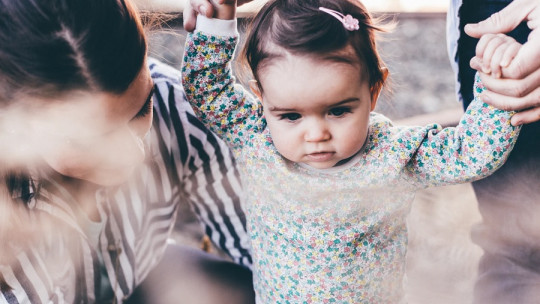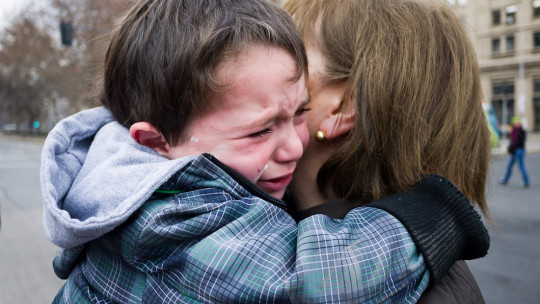Relationships are never easy Many times what seemed like it could last a lifetime stops working, making the decision to end the relationship.
Separation and/or divorce may or may not be a complicated process and cause deep suffering to one or both members of the couple. However, when the couple in question has children, it is necessary to take into account that it will also have an effect on their lives. That parents discuss the issue with them calmly and normalizing the situation is essential so that they can process it. But we must keep in mind that a four-year-old child does not have the same cognitive capacity as a ten-year-old child.
In this article we are going to observe How divorce can affect children depending on their age or how it can be interpreted according to age. We will also see how this very delicate topic can be discussed with them.
Children in divorce
The divorce process can be complex for a child to understand The child may not understand why his or her parents no longer want to be together when they always have been, or even think that he or she may have been to blame for his or her parents separating. Discussing the topic with them is essential.
Whatever age you are. It is necessary for him to know that the divorce is not for something for which he is responsible, that his doubts are resolved and it is explained to him in a clear way and adjusted to his capabilities. He should be allowed to be bad and his emotions regarding the situation should not be criminalized, but this does not mean that limits and routines should be eliminated. In addition It is important not to try to turn him against the other parent and unless there are reasons to do so, allow contact between the minor and both parents.
It must be taken into account that the minor may react by expressing different emotions and thoughts, or it may be a shock that causes him not to initially have a reaction. The child may take a while to express the pain, as he may enter a state of mourning and initially deny that the divorce is going to happen. It is important to ensure that the process is experienced in a normal way and with as little stress as possible, because if the divorce is not well handled and treated at home, it can generate frustration and anxiety. Prolonging the procedures or trying to pretend that nothing is happening can also prolong the situation and cause more suffering.
On the other hand, it must be understood that although parental divorce is a painful event for the minor, this does not have to assume that the boy or girl have some type of subsequent trauma, especially considering that nowadays it is common to see minors with divorced or separated parents. In fact, the management of the event and how it is represented and experienced in the home is more important than the fact of separation itself.
Psychological effects of parental separation on minors
The following indicates how divorce can be taken by children of different ages and some slight indications of how the communication of the decision to divorce could be attempted.
1. Divorce in children under two years of age
When the divorce occurs at a time when the son or daughter is a baby, he or she does not have sufficient intellectual capacity to understand what is happening However, changes in the routines and emotional state of the parents can be captured, which can cause fear, sadness, aggression and crying.
The most important thing at this age is that the minor does not perceive the separation as an abandonment by one of his parents, it being necessary for both to be able to access the minor frequently enough. You can also give an explanation of the situation, using tight and simple language.
2. When they are between two and three years old
It is at this stage of development that children begin to acquire speech and psychomotor skills, as well as various milestones in the acquisition of cognitive skills. It is common for setbacks to appear in the skills learned by the child as a result of stress, such as enuresis or encopresis. They tend to be more shy and have nightmares.
They also begin to be aware of their emotions but still do not know how to express them correctly. It is common for them to feel abandoned, or to fantasize about the return of their partner.
In this evolutionary moment It is useful to help you express your emotions yes, motivate him and make him see that both parents appreciate him. Despite the situation, a certain routine should not be stopped and the usual limits of behavior should be maintained.
3. Between three and seven years
As children grow, so do their cognitive abilities.
At this vital stage it is necessary to take into account that they are in a period in which their vision of the world starts from themselves, and in which magical thinking is also common. In other words, they are in an egocentric phase that can lead you to think that the breakup is your fault and in which they may also fear that they will stop being loved. They tend to become extremely obedient and/or deny the breakup of the relationship.
For this reason, at this vital stage, the divorce must be communicated in an understandable way, as well as guarantee that he is loved and will not be abandoned and that he is not to blame for the separation.
4. Between seven and twelve years of age
At this time, children have learned that there are different perspectives and sensations other than their own and they understand that their parents may be suffering, which is why they may not communicate their thoughts on the matter. You may experience noticeable declines in your school performance or behavioral problems such as fighting with other students
At this stage the minor understands the situation, and it is of great importance to explain both the situation and the changes that are going to be caused. However, it is possible that they still fantasize about the possible reconciliation of the parents, in which case it may be necessary to make them understand that this will not happen.
5. Teenagers and their parents’ divorce
Once adolescence arrives, the minor will little by little build his or her identity and reach an increasingly greater understanding of situations. In the context of a poorly handled divorce, it is possible that one of the parents will be blamed, who experience even greater rebellion than usual in this vital stage, who resort to risky behaviors. They may also try to act as confidants or protect their parents.
As a recommendation at this stage, it is worth communicating the situation clearly and involving him in some aspects such as custody, as well as not assigning roles that do not correspond to him and monitoring risky behaviors.
- Maganto, C. (1988). Marriage, separation, divorce and new couples. In: A. Espina (Ed.): Family relationships and their problems. University of the Basque Country. University Extension Notebooks. Editorial Service.
- Mauldon, J. (1990) The Effect of Marital Disruption on Children’s Health. Demography; 27(3): 431-446.
- Peterson, J.L., & Zill, Z. (1986). Marital disruption, parent-child relationships and behavior problems in children. Journal of Marriage and the Family, 48, 295-307.









